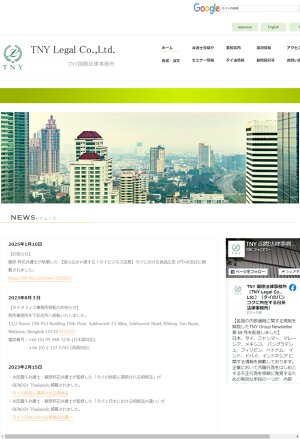Best Trademark Lawyers in Bangkok
Share your needs with us, get contacted by law firms.
Free. Takes 2 min.
List of the best lawyers in Bangkok, Thailand
Legal guides written by Smart Legal Solutions:
- Main Legal Measures to Protect Foreign Investment in Thailand
- The importance of the geographical indications for the Thai economy
Legal guides written by Mahanakorn Partners Group Co., Ltd:
- Thailand Strengthens Anti-Money Laundering Laws with New Amendments
- Recent Updates to Thailand’s Long-Term Resident (LTR) Visa and SMART Visa Programs
- Managing Risks in Public-Private Partnership Projects
Thailand Trademark Legal Articles
Browse our 2 legal articles about Trademark in Thailand written by expert lawyers.
- Understanding Trademark Laws in Thailand
- Despite several coups, Thailand's economy has remained strong and vibrant and has long attracted both local and international businesses from all around the world. As companies expand and enter fresh markets, the value of intellectual property (IP) becomes even more evident. Since it maintains a company's brand identity and safeguards... Read more →
- IP Protection in Thailand: A Comprehensive Guide for Businesses
- As Thailand grows into an important business place in Southeast Asia, companies must protect their ideas and new innovations. Thailand has laws and agrees to follow international rules that help you keep your valuable ideas and innovations safe. In this guide, we will learn about protecting your creations, innovations, and... Read more →
About Trademark Law in Bangkok, Thailand
Trademark law in Bangkok, Thailand, is governed by the Trade Marks Act B.E. 2534 (1991), as amended. This legislation provides the guidelines and procedures for the registration, protection, and enforcement of trademarks within the country. A trademark can include any logo, brand, name, word, letter, numeral, shape, sound, scent, or combination that is used to distinguish a product or service. The Department of Intellectual Property (DIP), under the Ministry of Commerce, is the primary authority responsible for trademark registration and regulation in Thailand.
Why You May Need a Lawyer
Engaging a lawyer is crucial for several reasons when dealing with trademarks in Bangkok, Thailand. A lawyer can help you:
- Conduct a comprehensive trademark search to ensure your proposed mark is not currently in use or registered.
- Navigate the complexities of the trademark registration process, ensuring compliance with all legal requirements.
- Handle oppositions, cancellations, and other disputes related to your trademark.
- Enforce your trademark rights by taking legal action against infringement.
- Draft and negotiate trademark licensing agreements.
An experienced lawyer can provide valuable advice and representation, helping protect your intellectual property and avoid costly litigation.
Local Laws Overview
The key aspects of trademark law in Bangkok, Thailand, include:
- Registerability: A trademark must be distinct, not conflicting with existing registered marks, and not descriptive or generic.
- Application Process: Applications must be filed with the Department of Intellectual Property and include the proposed mark, goods or services classification, and applicant details.
- Examination: The DIP examines applications for compliance with formal requirements and conducts a substantive examination for conflicts with existing marks.
- Publication and Opposition: Accepted applications are published in the Trademark Journal, allowing third parties to oppose registration within a specific timeframe.
- Duration and Renewal: A registered trademark is valid for ten years from the application date, with the possibility of renewal for consecutive ten-year terms.
Understanding these local laws is vital to ensuring your trademark is successfully registered and protected.
Frequently Asked Questions
What is a trademark?
A trademark is a sign capable of distinguishing the goods or services of one enterprise from those of other enterprises. They can include logos, names, words, sounds, and scents.
How long does trademark registration take in Thailand?
Typically, the entire registration process takes 12 to 18 months, though this can vary based on application completeness and any oppositions or disputes that arise.
What are the costs associated with filing a trademark in Thailand?
Fees can vary based on the type and number of classes applied for. Official government fees are accompanied by additional costs if employing a lawyer or trademark agent.
Can foreign entities register a trademark in Thailand?
Yes, foreign individuals and companies can register trademarks in Thailand, but they must appoint a local agent or lawyer to facilitate the process.
What should I do if my trademark is opposed?
If your trademark faces opposition during the registration process, consult with a trademark lawyer to gather evidence supporting your case and respond effectively to the opposition.
How is trademark infringement addressed in Thailand?
Trademark infringement can lead to civil and criminal penalties. Legal action typically involves filing a complaint with the court, seeking remedies such as injunctions, damages, and orders for the destruction of infringing goods.
What is a disclaimer in trademark registration?
A disclaimer is a statement that the applicant does not claim exclusive rights over a specific part of the mark that is considered unregistrable, often necessary when the mark contains common or generic terms.
Can trademarks be sold or licensed in Thailand?
Yes, trademarks can be transferred through assignment or licensed to third parties. Both actions require proper documentation and should be recorded with the DIP for legal recognition.
Do I need a trademark if I already have a business name registered?
Yes, a trademark provides intellectual property protection for your brand, offering more comprehensive legal rights than a business name registration, which is primarily administrative.
Can I register a trademark that is similar to an existing one but for different goods/services?
Similar trademarks can be registered for different goods or services, provided there's no likelihood of confusion among consumers regarding the source of the products or services.
Additional Resources
- Department of Intellectual Property (DIP): The government's official body for managing and regulating trademarks in Thailand.
- Intellectual Property Association of Thailand: Offers advocacy and support for intellectual property rights, including trademarks.
- World Intellectual Property Organization (WIPO): Provides international resources and tools for managing trademarks globally, including Thailand.
Next Steps
If you are considering applying for or already hold a trademark in Bangkok, Thailand, and require legal assistance, follow these steps:
- Consult with a trademark lawyer to evaluate your specific needs and determine the most suitable legal strategy.
- Gather all necessary documentation, including details of your mark and a list of goods/services associations.
- Utilize trademark search services to assess potential conflicts before filing an application or taking legal action.
- Consider engaging a local law firm or IP service provider for comprehensive support throughout the registration or enforcement process.
- Stay informed about updates or changes to trademark laws in Thailand through trusted legal advisors or resources.
Lawzana helps you find the best lawyers and law firms in Bangkok through a curated and pre-screened list of qualified legal professionals. Our platform offers rankings and detailed profiles of attorneys and law firms, allowing you to compare based on practice areas, including Trademark, experience, and client feedback.
Each profile includes a description of the firm's areas of practice, client reviews, team members and partners, year of establishment, spoken languages, office locations, contact information, social media presence, and any published articles or resources. Most firms on our platform speak English and are experienced in both local and international legal matters.
Get a quote from top-rated law firms in Bangkok, Thailand — quickly, securely, and without unnecessary hassle.
Disclaimer:
The information provided on this page is for general informational purposes only and does not constitute legal advice. While we strive to ensure the accuracy and relevance of the content, legal information may change over time, and interpretations of the law can vary. You should always consult with a qualified legal professional for advice specific to your situation.
We disclaim all liability for actions taken or not taken based on the content of this page. If you believe any information is incorrect or outdated, please contact us, and we will review and update it where appropriate.

















